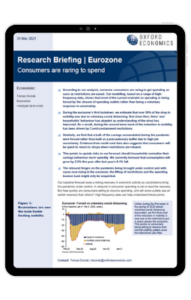Research Briefing
| Mar 31, 2021
Eurozone | Consumers are raring to spend

According to our analysis, eurozone consumers are raring to get spending as soon as restrictions are eased. Our modelling, based on a range of high-frequency data, shows that most of the current restraint on spending is being forced by the closure of spending outlets rather than being a voluntary response to uncertainty.
What you will learn :
- Since the eurozone’s first lockdown, firms’ and households’ behaviour has adapted as understanding of the virus has improved. As a result, during the second wave most of the reduction in mobility has been driven by Covid-containment restrictions.
- We find that a bulk of the savings accumulated during the pandemic were forced rather than built as a precautionary buffer due to high job uncertainty.
- Evidence from credit card data also suggests that consumers will be quick to return to shops when restrictions are relaxed.
Tags:
Related Services

Post
US Key Themes 2026: Exceptionalism amid fragmentation
US exceptionalism is alive and well, and that won't change in 2026.
Find Out More
Post
Global Key themes 2026: Bullish on US despite AI bubble fears
We anticipate another year of broadly steady and unexceptional global GDP growth, but with some more interesting stories running below the surface.
Find Out More[autopilot_shortcode]
